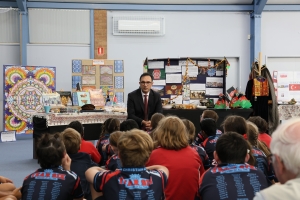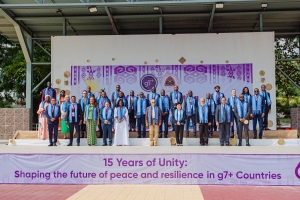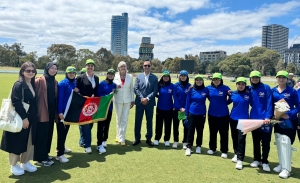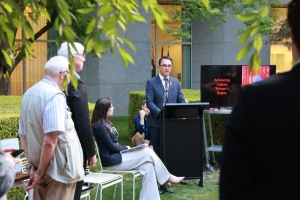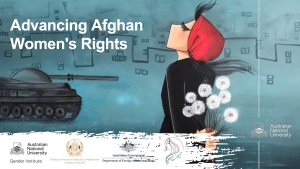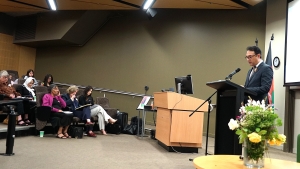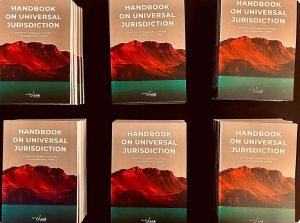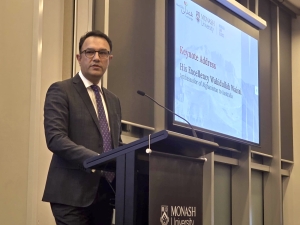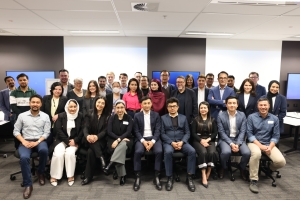Today, 30 March, marks the 56th anniversary of diplomatic relations between Afghanistan and Australia. Since 1969, the two nations have stood together, forging a relationship built on mutual respect, cooperation, and shared history.
To commemorate this milestone, we take a brief journey through key moments that have shaped the 56-year history of Afghan–Australian diplomatic engagement.
On 30 March 1969, Lewis H. (‘Lew’) Border became the first Australian Ambassador to Afghanistan, formally presenting his credentials—a necessary step in assuming his ambassadorial duties. A seasoned and accomplished career diplomat, Ambassador Border served during the early years of Afghan–Australian relations. This chapter came to a pause following the Soviet invasion of Afghanistan in 1978, which led to the suspension of diplomatic ties.
The visit of Sir John Kerr, Governor-General of Australia, to Afghanistan in 1974 (1353 in the Afghan calendar) paved the way for deeper bilateral relations. During this overland visit via the Torkham border, he met with Sardar Mohammad Daoud, then Prime Minister of Afghanistan, to discuss strengthening ties. One of the key topics of their meeting was facilitating consular services for Australian travelers passing through Afghanistan along the Hippie Trail. This marked the first official visit by a high-ranking Australian dignitary to Afghanistan.
On 1 May 1975, Dr. Ali Ahmad Popal, former Afghan Minister of Education and Ambassador to Germany, Turkey, and Pakistan, presented his credentials to the Governor-General in Canberra. Based in Tokyo, Dr. Popal became Afghanistan’s first non-resident Ambassador to Australia.
The connection between the peoples of Afghanistan and Australia stretches back even further, to the 1860s, when Afghan Cameleers contributed to the exploration and development of Australia’s vast interior, helping transport goods and open up the outback.
The September 11, 2001 terrorist attacks in the United States—carried out by al-Qaeda under Taliban protection—prompted a swift response from Australia. The Howard Government offered full support to the United States and joined international efforts to help restore Afghanistan’s security and development.
In this new phase of engagement, Mahmoud Saikal was appointed as Afghanistan’s first resident Ambassador to Australia. He presented his credentials on 27 June 2002 and served until 2005. During his tenure, he laid the foundation stone of the Afghan Embassy in Canberra in 2004. The Embassy officially opened on 18 August 2005.
In 2012, Afghanistan and Australia signed a Comprehensive Long-Term Partnership Agreement, solidifying their shared commitment to development, stability, and mutual cooperation. Since 2001, Australia has contributed more than $1.7 billion in development and humanitarian assistance to Afghanistan. Through its diplomatic, defence, and aid initiatives, Australia has been a strong supporter of Afghanistan's fight against terrorism and extremism.
Over the decades, the two countries have strengthened ties across a wide range of areas: development cooperation, humanitarian assistance, education—especially for women and girls—refugee support, diaspora engagement, and people-to-people links.
The post-2001 period saw a deepening of bilateral relations, highlighted by high-level visits and ongoing collaboration rooted in shared values.
Following the fall of Kabul on 15 August 2021, many Afghans—especially those at risk such as human rights defenders, civil society leaders, minorities, and female athletes—were forced to flee the country. In response, the Australian Government took significant steps to support those in vulnerable situations.
To coordinate its engagement, Australia established the role of Special Representative on Afghanistan (SRA), tasked with leading the government's response and liaising with domestic agencies and international partners to uphold Australia’s interests and assist the Afghan people.
After the Taliban’s takeover, formal diplomatic relations between the Australian Government and the Taliban regime were suspended, consistent with Australia’s policy of recognising States, not governments. Australia does not recognise the Taliban regime.
Nonetheless, the Embassy of the Islamic Republic of Afghanistan in Canberra continues to operate independently under the Vienna Convention of 1961. It remains committed to serving the Afghan people and maintaining the enduring ties between Afghanistan and Australia.
For the first time, the women’s national cricket team of Afghanistan, who were relocated to Australia after August 15, 2021, took to the field in an exciting match against the “Cricket Without Borders” team.
This remarkable event was made possible with the support of Cricket Australia, the Australian government, and passionate cricket enthusiasts. Among the distinguished guests were the Governor-General of Australia, Her Excellency Sam Mostyn; the Ambassador of Afghanistan, His Excellency Wahidullah Waissi; the Australian Assistant Foreign Minister, the Honorable Tim Watts; the Assistant Minister for Citizenship and Multicultural Affairs, the Honorable Julian Hill; along with diplomats, government officials, and devoted cricket supporters who stood in solidarity with the Afghan women’s cricket team.
Organising this match—an exceptional and commendable achievement for both the players and the organizers—was the result of tireless efforts. It took place against the backdrop of an Afghanistan where women and girls are forced into silence, merely surviving under oppressive restrictions. They are deprived of fundamental rights, including education, and are denied the freedom to speak out or even leave their homes independently.
Beyond being a sporting event, this cricket match served as a powerful voice for Afghan women and girls, a defiant stand against Talibanisation, and a rejection of the imposed identity that falsely claims to be part of Afghan and Islamic culture.
The Embassy of the Islamic Republic of Afghanistan in Canberra extends its heartfelt wishes for continued success and brilliance to these courageous athletes and reaffirms its commitment to supporting their growth, empowerment, and coordination.
Remarks by His Excellency Wahidullah Waissi, Ambassador of the Islamic Republic of Afghanistan at the Australian Parliament House
Advancing Afghan Women’s Rights, 25 November 2024
Hon Assistant Foreign Affairs Minister Tim Watts,
Hon Assistant Minister Julian Hill MP, Chair of the Aus-Afghan Parliamentary Friendship Group,
Hon Minister for Youth, Dr Anne Aly MP,
Hon Dr Andrew Charlton MP,
Members of Parliament,
Members of the Diplomatic Corps,
Colleagues from DFAT, our dear friend, Fred Smith,
Distinguished Participants,
Ladies and Gentlemen,
I begin by acknowledging the Ngunnawal people, the traditional custodians of the land on which we gather, and I pay my respects to their Elders past, present, and emerging.
It is an immense honour for me, the Embassy, and the women of Afghanistan to join our Australian friends and the Friends of Afghanistan to launch the 16 Days of Activism Against Gender-Based Violence here in Canberra—a city that embodies resilience, democracy, and multiculturalism.
Today, it was heartening to witness policymakers, activists, practitioners, lawyers, academics, media representatives, and individuals from diverse interest groups come together for a full day of activism at the Australian National University to address the critical human rights issues facing Afghan women and girls.
I extend my deepest gratitude to Azadi Zan (Women Freedom) for being the principal organizer of this event. A special thanks to our PhD scholar, Susan Hutchinson, for her tireless efforts in bringing this gathering to fruition. My appreciation also goes to the ANU Gender Institute, the Department of Foreign Affairs and Trade, and the Office of Dr. Charlton, MP, for their support in hosting this important event at Parliament House.
It was a Quality Day of Urgent Conversations
Today's discussions highlighted five key areas of grave concern—not only for Afghan women and girls but for allies, partners, and the global community at large. These critical areas include Gender Apartheid, Girls’ Education, Humanitarian Migration, Income Generation, and Women’s Health
The Reversal of Progress
Afghanistan, not far, just three and half years ago was a beacon of progress and gender equity. Its parliament was nearly gender-balanced, with women comprising almost half its members. Under the republican government, the country made great strides in policy, governance, and diplomacy, anchored in a constitution that upheld gender equality.
However, this progress has been tragically reversed. The military takeover dismantled the administrative structure, abolished the constitution, eradicated the electoral system, and dissolved the Human Rights Council.
In one of the most regressive moves, the Ministry of Women’s Affairs was replaced with a department enforcing oppressive morality laws—plunging the country back into the medieval ages.
The Gender Crisis in Afghanistan
Afghanistan has now become the epicentre of one of the most devastating gender crises in modern history. This reality is not just a tragedy for Afghan women; it is a catastrophe for the nation and its partners worldwide. Best for the international community to go beyond statements of condemnation and take meaningful action. Afghan women need allies who are unwavering in their advocacy and unrelenting in their support.
Four Key Actions for Change were also discussed:
Diplomatic Engagement and Pressure: We urge governments and international organizations to leverage all available tools to advocate for the reinstatement of women’s rights in Afghanistan. Countries engaging with the Taliban, even informally, must be held accountable for their actions and their impact on the Afghan people.
Targeted Support: Resources must be allocated to women-led organizations and initiatives, both within and outside Afghanistan, to sustain their vital work. In this context, I want to express my profound gratitude to the Australian government and their bipartisan stand, and to the people of Australia for their unwavering support of the Afghan people, particularly Afghan women and girls, over the past three years. Your efforts—facilitating evacuations and providing ongoing assistance—have been a lifeline. Thanks to your generosity, female judges, sportswomen, female artists, activists, and others at risk under the Taliban have found safety in Australia, where they can live freely and pursue their aspirations. This is not a loss of talent but a preservation of it—a “brain-saved” for the future of a post-Taliban Afghanistan.
Accountability Mechanisms: Gender apartheid in Afghanistan, as a systemic and institutionalized form of violence, must be recognized as a violation of international human rights law. Initiatives such as the joint effort by Australia, Canada, Germany, and the Netherlands to bring the Taliban to the International Court of Justice are vital steps toward justice and accountability.
Education as a Priority: Ensuring access to education for Afghan girls must remain a non-negotiable demand in all diplomatic and humanitarian efforts.
By committing to these actions, we transform solidarity into meaningful change and tangible outcomes.
Thank you.
Advancing Afghan Women’s Rights: A Summary Report
25 Nov 2025
On Monday 25 November 2024, the International Day for the Elimination of Violence against Women, academics, practitioners and activists gathered at the Australian National University for a comprehensive event on Advancing Afghan Women’s Rights. Azadi-e Zan was the primary organizer of the event, in collaboration with the Gender Institute at the Australian National University. His Excellency Ambassador Wahidullah Waissi delivered opening remarks on the status of Afghan girls and women, the international response, and the need for further discussions on advancing Afghan women's rights.
Panel discussions
The day’s panels delved into five critical themes: gender apartheid and breaches of rights, education, humanitarian migration, income generation and humanitarian assistance, and women's health. Esteemed speakers, including Virginia Haussegger AM, Elizabeth Broderick AO, and representatives from organizations such as ActionAid Australia, UNICEF Australia, Afghan Women on the Move, and Massoud Foundation contributed their expertise and insights.
The day began with a panel discussion on gender apartheid and the increasing practices of gender inequality in Afghanistan, chaired by Liz Broderick with three Afghan women with extensive experience in human rights law and advocacy. When the Taliban came to power, they disestablished the existing legal system that gender equality advocates had relied on to protect women and children in need. Without that, they are seeing an increase in practices such as forced and early marriage and domestic violence. There is also an entire regime of edicts and decrees restricting the rights of women and girls that members of the panel are involved in holding the Taliban accountable for at the International Court of Justice, the International Criminal Court and other fora.
The panel on girls’ education was chaired by UNICEF Australia and showcased the efforts of a range of Afghan and diaspora organisations who continue to deliver educational opportunities to Afghan girls, discussing how we can and must support these efforts. It is often these local, Afghan, diaspora and women led organisations that are able to best navigate around the Taliban to continue delivering accredited educational opportunities, but also hope to the girls of Afghanistan. Under the localisation agenda, these organisations cannot keep being excluded from funding opportunities.
The third panel, on humanitarian migration was chaired by the Refugee Council of Australia and featured three Australian panellists working to support various migration pathways for Afghans. They spoke about a range of pathways, but also the systematic barriers women face trying to access those pathways in a safe and timely fashion. Australia’s over reliance on UNHCR recognition is entirely unfair when the organisation is unreachable in both Iran and Pakistan. Home Affairs also has no means to functionally prioritise the highest risk cases for processing and has been asking for vulnerable Afghan women to be removed from the visa applications of their families.
A panel on income generation and humanitarian assistance covered the full breadth of issues affecting women’s wellbeing from access to income generation opportunities to humanitarian assistance. Discussions included high rates of malnutrition among Afghan women and the ever-present problem of the girls’ education ban. The session was chaired by the Australian Council for International Development and panellists included Australians and Afghans with international and localised experience in community development, humanitarian assistance and women’s philanthropy. There remains a dire need to fund women led organisations and develop creative ways to ensure Afghan women have access to both development and humanitarian funding in the country.
The women’s health panel was chaired by gender equality advocate Virginia Haussegger and featured an Afghan and an international speaker discussing a range of health issues affecting Afghan women both inside Afghanistan and in the diaspora. These issues included sexual and reproductive health, mental health, breast and other cancers. The lack of health education for women in Afghanistan means there is a significant pipeline problem for female health workers in the country and women are only allowed to see female health workers, further restricting their access to health services in the future.
Women’s market
Four groups participated in the Afghan women’s market during the lunch break and at parliament house in the evening. The market allowed event participants to feel positively connected to the culture of Afghanistan, including the handicrafts of Afghan women. But importantly, it opened market opportunities for those women here in Australia. The rug seller who attended recently changed their buying practices so that all wholesale prices go directly to the women weavers in Afghanistan. The jewellery and high-quality photographs on sale supported two different girls’ education organisations. Embroidered items that were sold are produced while girls pretend not to be learning English and maths in underground schools in the north of the country. Slippers and saffron that were on sale are produced by women in Herat and Bamiyan and support the work of a women’s rights organisation. Thousands of dollars were raised overall that will go directly into the pockets of women in Afghanistan.
Parliamentary reception
The parliamentary reception was co-hosted by the Parliamentary Friendship Groups for Afghanistan and Amnesty International. It was managed by the office of Andrew Charlton MP. Assistant Minister for Foreign Affairs Tim Watts MP provided opening remarks ‘helping us to ensure an ongoing focus on the lives and welfare of Afghan women and girls under the repressive Taliban regime’ and reminding the group of the need for the Taliban to be held accountable for their crimes against women. Ambassador of Afghanistan to Australia, HE Wahidullah Waissi delivered his concluding remarks, emphasizing key areas of focus in transforming solidarity into meaningful change and tangible outcomes to support Afghan girls and women during these challenging times. The event was well attended including by Ministers/MPs/Senators: Anne Aly, Kate Thwaites, Julian Hill, Zali Stegall, and Senator Fatima Payman.
A report will be prepared compiling the recommendations developed during the small group discussions, for how the Australian Government can better support Afghan women’s rights in the current context, and moving forward. It is expected this report will be released on International Women’s Day 2025. While many of the recommendations will be directed at the Department of Foreign Affairs and Trade, and the Australian Aid program, some will be more internally focussed including for the States and Health Departments, and some will have a legal focus.
Interactive breakout sessions provided attendees with the opportunity to develop actionable recommendations for the Australian Government, which will be compiled into a report for publication. The event concluded with a strong sense of shared purpose, highlighting Australia’s crucial role in supporting Afghan women and advocating for their rights on the global stage.
This remarkable event underscored the power of unified advocacy and meaningful action in advancing gender equity and justice for Afghan women.
The event was gratefully held with the support of ANU Gender Institute; Department of Foreign Affairs and Trade; and the Embassy of the Islamic Republic of Afghanistan, Canberra, Australia.
Opening Remarks by His Excellency Wahidullah Waissi Ambassador of the Islamic Republic of Afghanistan on 16 Days of Activism Against Gender-Based Violence and Advancing Afghan Women’s Rights Conference in Canberra
25 November 2024
Excellencies,
Members of the Diplomatic Corps,
Distinguished Participants,
Ladies and Gentlemen:
I also begin by acknowledging the Ngunnawal people, the traditional custodians of the land on which we gather, and pay my respects to their Elders past, present, and emerging. Thanks Aunty Violet Sheridan for your powerful welcoming notes.
At the outset, allow me to express my deepest gratitude to those who have worked tirelessly to organize this significant event. A special thanks to Susan Hutchinson, an ANU PhD scholar, a passionate advocate for Afghan girls, and the director of Azadi Zan, whose work exemplifies unwavering dedication to the rights and dignity of Afghan women. My sincere thanks also go to the ANU Gender Institute, the Department of Foreign Affairs and Trade, and the Hedley Bull School for their invaluable support in making this timely gathering possible. I would also thank the volunteers and my Embassy staff for their part in today’s event.
I extend my appreciation to the assigned panelists, speakers, and each of you in the audience for your presence today as we kick off the 16 Days of Activism Against Gender-Based Violence, with a particular focus on the plight of Afghan girls and women.
The Harrowing Reality for Afghan Women
Today, I address you not just as an ambassador but as an advocate for millions of Afghan women and girls whose rights have been systematically stripped away. Their voices, often silenced, demand to be heard.
Afghanistan has become the epicenter of one of the most devastating gender crises in modern history.
Women are banned from attending school beyond the sixth grade, barred from universities, and excluded from the workforce. Even the simple act of speaking to one another in public is forbidden. This is not just discrimination; it is gender apartheid—a calculated and institutionalized effort to erase women from public life.
Beyond these restrictions, Afghan women face pervasive violence: forced marriages, domestic abuse, and human trafficking occur with alarming frequency, with no legal protections or recourse.
In Afghanistan, the souls of girls and women crumble one by one, most of the time unseen and unheard, under the oppressive weight of the Taliban’s regime—much like the destruction of tall buildings in Ukraine and Gaza, though their collapse is visible to the world. This reality is not only a tragedy for Afghan women but a catastrophe for Afghanistan.
A society cannot thrive while suppressing the potential, creativity, and agency of half its population.
The Role of the International Community
The international community must move beyond words of condemnation to meaningful actions. Afghan women need allies who are unrelenting in their advocacy and unwavering in their support. Key actions must include:
A – On Diplomatic Pressure: Governments and international organizations must use every tool available to advocate for the reinstatement of women’s rights in Afghanistan.
Countries engaging with the Taliban, even informally, must be held accountable for their actions and their impact on the Afghan people.
B – On Targeted Support: Resources must be directed to women-led organizations and initiatives both inside and outside Afghanistan to sustain their vital work.
In this context, I want to extend my heartfelt gratitude to the Australian government and people for their unwavering support of the Afghan people, particularly Afghan girls and women, over the past three years.
From facilitating evacuations to providing ongoing assistance, your generosity has been a lifeline. Your efforts have enabled female judges, Afghan sportswomen, female artists, activists, and others at risk under the Taliban to find safety in Australia, where they can pursue their passions, live freely, and enjoy the rights denied to them in Afghanistan. This is not a loss of talent but a preservation of it—a brain-saved for the future of a post-Taliban Afghanistan.
I especially thank the Department of Foreign Affairs and Trade, Home Affairs, and other State-level Departments for their instrumental roles in these initiatives.
C – On Accountability Mechanisms: The systemic violence and gender apartheid in Afghanistan must be recognized as violations of international human rights law. Recent initiatives, such as the joint effort by Australia, Canada, Germany, and the Netherlands to bring the Taliban to the International Court of Justice, are critical steps toward accountability.
D – On Education as a Priority: Access to education for Afghan girls must remain a non-negotiable demand in all diplomatic and humanitarian efforts.
The Role of the Afghan Diaspora and Civil Society
The Afghan diaspora has a unique and crucial role in this struggle. They are the voices for those who cannot speak freely.
By amplifying the stories and struggles of Afghan women, advocating for their rights, and ensuring their plight remains visible on the global stage, the diaspora can sustain pressure for meaningful change.
Civil society organizations, academics, and media also play a vital role in keeping this issue at the forefront of international discourse.
A Call to Action
As we inaugurate this event, let us honour the courage of Afghan women and girls by transforming solidarity into action.
Today’s discussions bring together a diverse group of leaders from policy and practice who will share their insights and propose tangible solutions. This event itself is an act of activism, inspiring awareness and driving change.
Afghan women’s fight is not just their fight—it is a fight for humanity, equality, and justice. Their voices, though suppressed, are powerful. Their courage, though tested, is unbreakable. And their hope, though fragile, remains a beacon for all of us who believe in a better future.
Together, we must work to ensure that their rights are not only restored but upheld and celebrated as a cornerstone of Afghanistan’s path forward.
Melbourne, 19 September 2024 - At the recent launch of the "Handbook on Universal Jurisdiction: Holding the Taliban Accountable for International Crimes", key figures from the legal, diplomatic, and academic spheres gathered to discuss the critical importance of pursuing justice for crimes committed in Afghanistan.
The event, held in collaboration with Monash Law, saw a range of distinguished speakers, including the Hon. Justice Lesley Taylor of the Victorian Court of Appeal, His Excellency Ambassador Wahidullah Waissi, Ambassador of I. R. of Afghanistan, and several experts such as Dr. Niamatullah Ibrahimi, Ahmad Shuja Jamal, Sareta Ashraph, and Dr. Melinda Rankin.
In his keynote remarks, Ambassador Waissi discussed about the importance of Universal jurisdiction as a powerful legal principle tool. He added "Universal Jurisdiction allows states to prosecute individuals for serious international crimes, such as genocide, war crimes, and crimes against humanity, regardless of where these crimes were committed, the nationality of the perpetrator, or the victim." He continued "this principle holds particular importance for Afghanistan, where the rule of law has been systematically dismantled by the Taliban’s return to power in August 2021. With no possibility of accountability within Afghanistan under Taliban rule, UJ offers a critical path forward. It empowers other nations to act when justice is otherwise inaccessible."
Ambassador remarked, “t is essential for the international community to step forward and use every available tool—whether through Universal Jurisdiction, UN treaty bodies, or regional diplomacy—to hold the Taliban accountable. The stakes are too high to remain passive.” He also thanked the organisers—Azadah Raz Mohammad, Karin Frodé, ofHam Diley Campaign and Monash Law—for their dedication in producing this timely resource, which will serve as a crucial tool for professionals and diaspora groups seeking justice on the international stage.
The handbook provides valuable guidance on how to leverage universal jurisdiction to hold the Taliban accountable for international crimes, underscoring its significance in the broader global justice movement.
To access full remarks of Ambassador Waissi, click here.
Keynote Address by His Excellency Wahidullah Waissi, Ambassador of Afghanistan to Australia on the occasion of launching Handbook on Universal Jurisdiction: Holding the Taliban Accountable for International Crimes
Thursday 19 September
Monash University Law Chambers, Melbourne, Australia
Ladies and gentlemen, distinguished guests,
Thank you for the opportunity to speak on a matter that is not only urgent but fundamental to the future of justice and accountability for the people of Afghanistan.
Today, we gather to launch the Handbook on Universal Jurisdiction: Holding the Taliban Accountable for International Crimes—a resource that will guide us in understanding how the international community can step up when domestic legal systems fail.
At the outset, please allow me to express my gratitude to the Ham Diley Campaign and its Co-Founders, Azadah Raz Mohammad and Karin Frodé, for their outstanding work in producing this timely and necessary document.
The contributions made by Monash University, particularly Monash Law Clinics Melbourne team, and their invaluable support are commendable.
Before I begin my keynote remarks, I would like to take a moment to remember the targeted killing of 15 innocent civilian who were brutally taken from their cars and murdered.
This atrocity is part of the ongoing, systematic killing of the Hazara community—a genocide and a crime against humanity.
My deepest condolences go out to their families.
It is precisely these heinous acts that bring us together this evening, as we discuss how to hold the Taliban accountable for the crimes they continue to commit.
The Importance of Universal Jurisdiction (UJ) cannot be more emphasised:
Universal jurisdiction is a powerful legal principle that allows states to prosecute individuals for serious international crimes, such as genocide, war crimes, and crimes against humanity, regardless of where these crimes were committed, the nationality of the perpetrator, or the victim.
This principle holds particular importance for Afghanistan, where the rule of law has been systematically dismantled by the Taliban’s return to power in August 2021.
With no possibility of accountability within Afghanistan under Taliban rule, UJ offers a critical path forward. It empowers other nations to act when justice is otherwise inaccessible.
This handbook provides a roadmap for how we can use UJ to hold members of the Taliban accountable for the atrocities they have committed and continue to commit against innocent civilians, women, and minorities.
The Role of Treaty Bodies are crucial:
Alongside UJ, UN treaty bodies play a vital role in accountability efforts. As highlighted in recent discussions at the HRC57 event, treaty bodies like Convention on the Elimination of All Forms of Discrimination Against Women and the Human Rights Committee are key instruments in bringing attention to the systematic violations of human rights, particularly against women and girls in Afghanistan.
However, their role is complicated by legal and practical barriers, including Afghanistan’s limited acceptance of key international protocols.
There is a need, however, for an all-tools approach—combining legal mechanisms, public awareness campaigns, and civil society involvement to maximize the chances of holding the Taliban accountable.
The importance of engaging with treaty bodies like CEDAW to ensure that the voices of Afghan women and girls, who have suffered immensely under Taliban rule, are amplified.
Their rights must not be overlooked, and mechanisms like CEDAW can still play a role, even in this challenging context.
Challenges to Accountability:
There are, of course, numerous challenges in pursuing accountability through both Universal Jurisdiction and treaty bodies.
First, political considerations often hinder the exercise of UJ. Governments may hesitate to use UJ, fearing diplomatic fallout or the complexity of gathering reliable evidence from conflict zones like Afghanistan.
Additionally, without Afghanistan’s formal participation in key UN mechanisms, accessing justice through treaty bodies remains difficult.
The handbook brings together a good analytical set of study and a sharp set of UJ frameworks by comparing six countries, where accountability for atrocities in Afghanistan can be sought.
Additionally, more creative and collaborative solutions are essential. We must explore innovative ways to use Afghanistan’s fourth periodic CEDAW report as a platform to raise these critical issues at the international level, ensuring that targeted killings, violations of women’s and children’s rights, and the forced economic depression inflicted on the country are not forgotten."
The importance of international mechanisms and the need for better coordination between Geneva and New York-based UN bodies cannot be overstated. It is crucial to involve more Afghan scholars, activists, and civil society representatives to enhance the credibility and effectiveness of accountability efforts.
Success Stories and Hope:
Despite these hurdles, we have seen successes that should give us hope.
The recent conviction of a Syrian intelligence officer in Germany for crimes against humanity, prosecuted under Universal Jurisdiction, proves that accountability is possible when there is political will and judicial cooperation.
This case shows that even when domestic justice systems fail, international mechanisms can bring perpetrators to justice.
The Handbook on Universal Jurisdiction that we launch tonight is not just a legal guide; it is a beacon of hope for victim-survivors in Afghanistan.
It acknowledges that accountability is not a straightforward path, but it is achievable.
With the right strategies, coordinated action, and strong political will, we can ensure that those responsible for the heinous crimes in Afghanistan face justice.
A Call to Action:
Ladies and gentlemen, let me be clear: without accountability, there can be no justice.
This is why it is essential for the international community to step forward and use every available tool—whether through Universal Jurisdiction, UN treaty bodies, or regional diplomacy—to hold the Taliban accountable.
The stakes are too high to remain passive.
As we look to the future, we must also look to the next generation—those who will continue this fight for justice long after us.
This Handbook is a tool for them as much as it is for us.
It empowers victim-survivors and legal professionals alike to take meaningful steps towards justice.
Our Afghan diaspora community plays a pivotal role in taking critical steps toward justice, by advocating for Universal Jurisdiction to hold the Taliban accountable.
Being outside Afghanistan, we are uniquely positioned to raise awareness, document atrocities, and push for legal actions that are impossible within the country.
Our collective voice amplifies the call for accountability, ensuring that the suffering of our people is not forgotten and that justice is pursued on the global stage.
Through initiatives like this Handbook, the diaspora becomes a powerful force for truth and justice.
In closing, I urge everyone here today to support these efforts.
Let this launch be the beginning of renewed energy and commitment to pursuing justice for Afghanistan.
Let us continue to amplify the voices of Afghan women, children, and all those who have suffered under the Taliban’s regime.
The international community has a moral and legal obligation to ensure that these crimes do not go unpunished.
We owe it to the victims, to future generations, and to the principles of justice itself.
The Handbook begins with the timeless and eloquent words of Sa’adi, whose centuries-old poetry continues to inspire and guide us.
As I conclude my remarks, I would like to leave you with a verse from Hafez, another great poet of our heritage, whose words have always illuminated the path to enlightenment for generations:
رسید مژده که ایّام غم نخواهد ماند
چنان نماند چنین نیز هم نخواهد ماند
ز مهربانی جانان طمع مبر حافظ
که نقش جور و ستم نخواهد ماند
Arrived the glad tidings that grief's time, shall not remain
Like that joy's time remained not; like this grief's time, shall not remain
Hafiz sever not desire for the true Beloved's favour
For the picture of violence and the mark of tyranny, shall not remain
Thank you.
The "Three Years of Taliban Rule in Afghanistan" conference was held on 31st of August 2024 with the aim of analyzing and addressing the complex crisis in Afghanistan. Attended by academic and non-academic experts, diplomats, policymakers, human rights activists, and advocates for women's rights, the conference offered a full day of in-depth discussions on Afghanistan’s humanitarian, human rights, and political crises.
Ambassador Wahidullah Waissi participated in and had an interactive remarks on this timely and well-organized. This comprehensive gathering was an important step in addressing the ongoing crises in Afghanistan and fostering dialogue on the international stage. It highlighted the need for collaborative action and deepened understanding of the multifaceted issues faced by the Afghan people under Taliban rule.
The conference began with an opening address by Richard Bennett, the United Nations Special Rapporteur on Human Rights in Afghanistan. In his keynote speech, Bennett highlighted the alarming deterioration of human rights under Taliban rule, emphasizing the urgent need for international attention and action. He provided a comprehensive overview of the systematic violations of human rights, particularly focusing on the plight of women, children, and ethnic and gender minorities. Bennett stressed the importance of unified and immediate global responses to these challenges.
The conference was structured around the following five key themes:
Diplomatic Engagement with the Taliban: The first panel explored the challenges of engaging diplomatically with the Taliban and its impact on the humanitarian crisis and ongoing human rights abuses. The discussion underscored the importance of principled engagement that upholds human rights, fosters political legitimacy, and adheres to international norms.
Systematic Human Rights Violations: In the second panel, experts examined the Taliban's systematic policies of human rights violations and the use of violence to enforce discrimination, suppression, and marginalization. The panelists outlined the devastating consequences of these policies, especially for women, vulnerable groups like the Hazaras, and the future generations of Afghanistan.
Security Challenges and Regional Stability: The third panel addressed the security challenges under Taliban rule and the impact of their return to power on regional and global stability. The focus was on human and social security, particularly for marginalized communities. The panel emphasized that Afghanistan, under the Taliban, has become a growing hub for terrorism and extremism, posing serious security threats to the region and beyond.
Humanitarian Needs and Aid Delivery Challenges: The fourth panel discussed the humanitarian needs and the challenges of delivering aid under the Taliban’s restrictive governance. The conversation revolved around potential strategies for negotiating humanitarian access, despite the Taliban-imposed barriers.
Role of Diaspora Organizations: The final panel explored the role of diaspora organizations in addressing these crises and their efforts to bring about meaningful change in Afghanistan.
The Embassy of Afghanistan is pleased to be part of this important conference alongside young scholars from Afghanistan and Australia. This conference was jointly hosted by Deakin University, Monash University, and La Trobe University in Melbourne.


